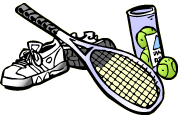TENNIS ACTIVITY CARD
Parts of the Body Worked

Upper & Lower Legs

Heart & Lungs

Arms

Abs

Want to know how to be a tennis all-star?
Gear Up
What’s all the racket about racquets? Well, you can’t play tennis without one. If you’re buying a junior racquet, choose the longest one that you can comfortably use. Want more information on selecting a junior racquet? If you weigh more than 85 pounds you should look for an adult racquet.
When you have a racquet, you’ll need to find a court. Look around at school or at parks in your neighborhood. Then, put on socks (if they’re not cotton, they’ll help you avoid blisters) and sneakers with good ankle support. Don’t forget the tennis balls!
Games
Fish in the Pond: Try tossing the ball onto your racquet or into a hula-hoop on the ground to practice aiming your toss.
Overhead Ball Catch: Toss the ball up like you are about to serve and catch it just above your head.
Two-Handed Alligator Catch: Stretch out your arms straight in front of you like they are the top and bottom of an alligator’s mouth. Have a friend throw the ball toward you and slap your hands together to catch it. After each catch, make the alligator’s mouth a little bigger.
Play it Safe
Tennis is an activity that forces you to turn your body quickly in many different directions, so make sure you warm up and stretch before playing. Wear tennis shoes with good support to protect your ankles and thick (not cotton) socks that fit well to prevent blisters on your feet. To prevent hand blisters, keep your racquet handle dry by using sawdust or hand chalk. Always bend your arm when you swing, or else it might start to hurt — a problem known as “tennis elbow.” Clip your toenails and make sure there is extra room in your shoes, because “tennis toe” can be nasty too!
To protect other players, never throw your racquet or tennis balls, and try to keep loose balls off the courts. Be courteous and keep yourself and others safe by staying off courts where other people are playing.
When you’re outside waiting to play, sit in the shade and drink lots of water — that way you’ll stay cool and won’t get sunburned. While you are playing, take a break between games or sets to cool off. And you may want to keep a wet towel around your neck while you wait. Also, you can look and feel cool by wearing a cold, wet bandana on your head while you play. And always wear sunscreen! Want to read more about keeping your cool or how to protect yourself from the sun?
How to Play
Tennis is a fun activity that two people (a “singles” match) or four people on two separate teams (“doubles”) can play. You can play with friends at your local tennis courts, or join an organized team. When you start playing tennis, some of the key strokes you should learn are: serve, forehand, backhand, two-handed backhand, volley, and smash. But first, check out these basic skills to get you started!
Holding the Racquet. The racquet handle has eight sides — four are flat and four are angled. Take the racquet handle between your thumb and index finger of your dominant hand (the one you write with) as if you were shaking hands. The knuckle on your index finger should be on the top right angle. Then, grip and make sure it feels comfortable. Separate your third and fourth fingers slightly.
Serving. Hold the ball with the thumb, index finger, and middle finger of your free hand (hand not holding the racquet). Extend the arm with the ball just in front of you and then raise it above your head. Toss the ball gently, so it goes a few inches higher than the full height of the racquet extended above your head. Keep your eye on the ball. Bring the racquet around above your shoulder and hit the ball while it’s in the air. Try to use the same toss every time.
Receiving and Returning the Ball. Stand in the middle of the court and hold the racquet gently with both hands so you can run in either direction when the ball comes over the net. When the ball is hit to your forehand side (e.g., right if you’re right-handed), step toward the ball with your opposite leg and swing! If the ball comes to your backhand side (left if you’re right-handed), go for the ball with your dominant arm in front of your chest and your other hand holding the racquet as well. Swing without moving your wrists.
Ology
Wondering why tennis balls are so fuzzy? The fuzz increases the wind resistance, which slows down the ball and helps the players to volley (hit the ball back and forth without stopping) longer. Without it, the ball would fly off the court after every serve! The fuzz also helps players control the ball, by keeping it stuck to their racquet strings for just a little longer when they hit it.
Fun Facts
Advanced players can serve a ball at more than 100 miles per hour, making it travel 80 feet across the court in less than one second!
The world’s first tennis tournament took place in Wimbledon, England in 1877.
You might have heard tennis players saying the word “love” a lot around the courts. Unless it’s Valentine’s Day, they’re probably talking about the score! In tennis, “love” means that your opponent has not scored any points yet and has a score of zero. Also, in tennis one point = 15, two points = 30, three points = 40, and usually, 4 points = a win!
Related Links
- Page last reviewed: May 9, 2015
- Page last updated: May 9, 2015
- Content source:



 ShareCompartir
ShareCompartir